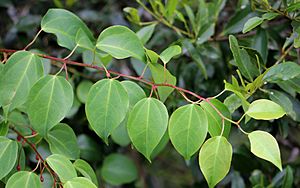Berberidopsis beckleri facts for kids
Quick facts for kids Berberidopsis Beckleri |
|
|---|---|
 |
|
| Dorrigo National Park, Australia | |
| Scientific classification | |
| Genus: |
Berberidopsis
|
| Species: |
beckleri
|
| Synonyms | |
|
|
Berberidopsis beckleri is a cool climbing plant. It grows in the rainforests of eastern Australia. A scientist named Ferdinand von Mueller first described this plant. He found it near the Clarence River in Australia.
Contents
About Berberidopsis beckleri
Berberidopsis beckleri is part of a small plant family called Berberidopsidaceae. This family has only a few species. It's special because of how it fits into the larger plant family tree.
How the Plant Looks
Berberidopsis beckleri is a vine that climbs. Each year, new shoots grow. These shoots first produce flowers near the leaves. Later, they grow into long, twining stems that help the plant climb.
Flowers
The flowers of Berberidopsis beckleri are unique. They grow in a spiral pattern. It's hard to tell the difference between their bracts, sepals, and petals.
The flowers hang down on long stalks. They often have less red color towards their center. The parts of the flower that protect the inside (called the perianth) get bigger from the outside in.
Petals
The flowers have between 13 and 16 petal-like parts. The tips of these parts are flat.
Inner Petal-like Parts
The inner petal-like parts are bigger than the outer ones. They form a cup shape. This shape protects the plant's sexual organs.
Stamens
The stamens are the male parts of the flower. They are arranged in a single row. Each stamen has a filament that holds up the anther. The number of stamens can be 8, 11, or 13. A disc that produces nectar surrounds the stamens.
Ovary
The Ovary is the female part of the flower. It holds the ovules, which will become seeds. The ovary is oval-shaped. It has a thick style and green stigma lobes.
Leaves
The leaves are simple and oval-shaped. They grow alternately along the stem. They have veins that spread out like a hand. The leaves are usually 3 to 6 centimeters long. They feel soft and thin. They also have a slightly hairy look along the main midvein and lower veins.
Fruits
The fruits of this plant are berries. They are surrounded by the leftover parts of the style and stigma. Each berry usually produces between 100 and 200 seeds.
Types of Berberidopsis
The genus Berberidopsis has two main species:
- Berberidopsis beckleri
This plant was first described in 1862. It was originally called Streptothamnus beckleri. But in 1984, a scientist named Jan Frederik Veldkamp moved it to the Berberidopsis group. This was because its seeds, pollen, and wood were very similar to other Berberidopsis plants. They were different from Streptothamnus moorei.
- Berberidopsis corallina
This species is also very important in understanding plant evolution. It is known as the coral plant of Chile. It's a woody vine that is now threatened. People in the Mapuche tribe in southern Chile use its stems to make traditional baskets.
Where They Grow
Berberidopsis beckleri is found in Queensland and New South Wales, Australia. It forms the family Berberidopsidaceae along with another Australian plant, Streptothamnus.
Berberidopsis corallina grows in two different countries. You can find it in the Patagonian parts of Chile and Argentina.
Habitat
These plants like to grow in cooler Rainforests. In Australia, they are found north of the Barrington Tops area.
Where They Have Been Seen
Berberidopsis beckleri was first found in three special places:
- Australian National Botanic Gardens, Canberra
- Dorrigo National Park
- Junuy Juluum National Park

